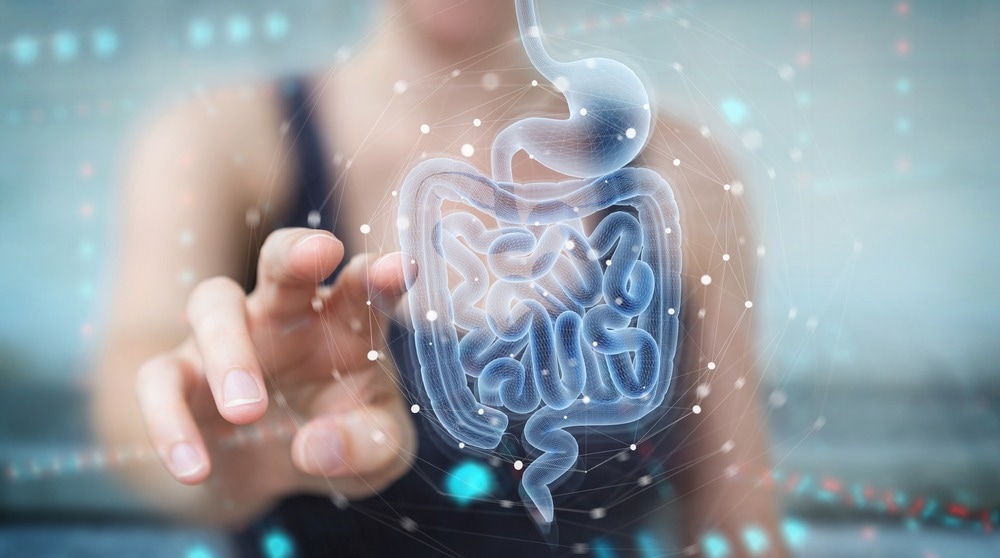The variety of enzymes that microbes employ to make energy in the low-oxygen environment of the gut is highlighted by a survey of bacterial genomes.

Image Credit: sdecoret/Shutterstock.com
The gut microbiome is frequently referred to as an additional digestive organ due to its great benefits to human health and digestion. The intestine’s large population of bacteria and other microorganisms aids in the breakdown of food and produces nutrients and other metabolites that have a variety of effects on human health.
According to recent research from the University of Chicago, some of these microbial assistants are also incredibly resourceful, possessing a wide range of genes that enable them to produce energy for themselves and possibly have an impact on human health.
The study, which was published on January 4th, 2024 in Nature Microbiology, found that three genetically unrelated families of gut bacteria use 22 metabolites as a substitute for oxygen during respiration in the anaerobic gut environment.
These bacteria also contain many more copies of their genes for making the enzymes that break down these alternative metabolites - up to hundreds - than have been found in bacteria found outside of the digestive tract. These findings imply that anaerobic gut bacteria might also be able to generate energy from hundreds of different substances.
These are examples of some of the peculiar metabolisms that act on all these different metabolites produced by the gut microbiome. This is interesting because one of the main ways the microbiome impacts our health is by making or modifying these small molecules that can then enter our bloodstream and act like drugs.”
Samuel H. Light Ph.D., Neubauer Family Assistant Professor and Senior Author, Department of Microbiology, University of Chicago
At the organism level, respiration commonly refers to the act of inhaling oxygen. However, at the cellular level, respiration denotes a biochemical process that generates energy. While most cells rely on oxygen for respiration, in anaerobic settings like the interior of the intestine, cells have adapted to utilize alternative molecules for this purpose.
Fermentation and respiration are the two primary metabolic processes used by cells to generate energy. During fermentation, the cell directly produces energy by dissolving molecules. Two molecules are involved in respiration: an electron acceptor and an electron donor.
Oxygen serves as the acceptor and glucose as the donor is a well-known illustration of this process. Before transferring the extracted electrons to an oxygen molecule, the cells go through a sequence of steps to break down the glucose. This causes the cell to produce adenosine triphosphate, or ATP, which is the fundamental energy source used and stored within cells.
The majority of gut microbes are known to use fermentation, but there are also a number of bacteria that have respiratory metabolisms, such as those that use sulfate and carbon dioxide as electron acceptors.
Light and his associates examined over 1,500 genomes from a database of human gut bacteria to conduct the new study. The distribution of genes that produce reductases, which are enzymes that utilize various respiratory electron acceptors, was observed to be unexpected.
A tiny percentage of genomes encode more than 30 distinct reductases, whereas the majority only encode a few. These bacteria originated from three different and distantly related families - the Burkholderiaceae, Eggerthellaceae, and Erysipelotrichaceae - that were separated by hundreds of millions of years of evolutionary history, indicating that the bacteria were not closely related.
Compared to bacteria with respiratory metabolisms that exist outside of a host organism and primarily use inorganic compounds, these bacteria seem to be more adaptive. Light and colleagues found that the respiratory gut bacteria are specialized in different organic metabolites, which makes sense considering the continuous supply of food.
There is so much organic matter in the gut that comes from the food we eat. It’s chemically complex, and you need more enzymes to accommodate it in that environment. We think this variety of genes enables gut bacteria to use a lot of different things that come their way.”
Samuel H. Light Ph.D., Neubauer Family Assistant Professor and Senior Author, Department of Microbiology, University of Chicago
A few of the metabolites they employ also have intriguing consequences for gut health in humans. For instance, blood levels of imidazole propionate, an amino acid byproduct, are higher in type 2 diabetics. Itaconate is a metabolite that macrophages produce in response to infections, and resveratrol is another metabolite that affects various immune systems and metabolic functions.
Light hopes that more studies along these lines will shed light on the roles played by various gut microbes and use that knowledge to promote better health.
I’m hoping our understanding of these different metabolisms and how they work will enable us to come up with strategies to intervene - either through the diet or pharmacologically - to modulate the flow of metabolites through these various pathways. So, in whatever context, like type 2 diabetes or following an infection, we could control which metabolites are being produced to have a therapeutic benefit.”
Samuel H. Light Ph.D., Neubauer Family Assistant Professor and Senior Author, Department of Microbiology, University of Chicago
Source:
Journal reference:
Little, S. A., et al. (2024).Dietary- and host-derived metabolites are used by diverse gut bacteria for anaerobic respiration. Nature Microbiology. doi/s41564-023-01560-2